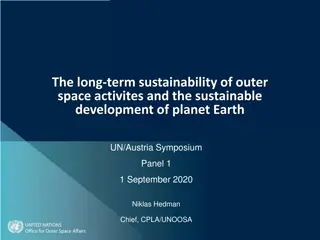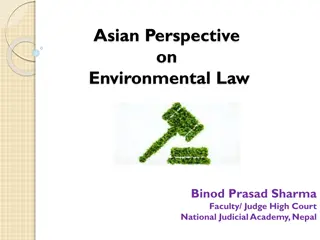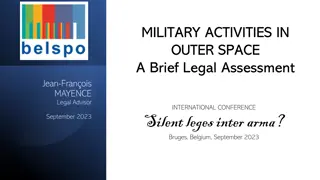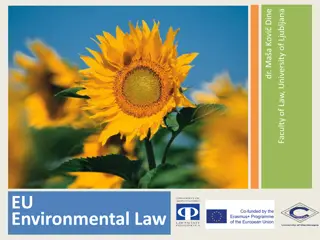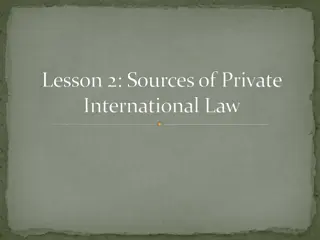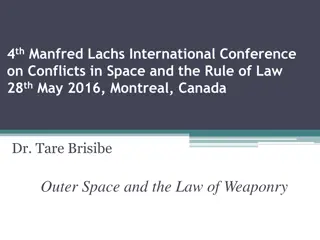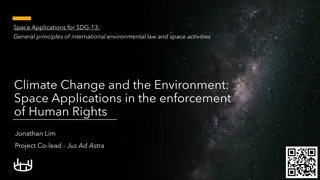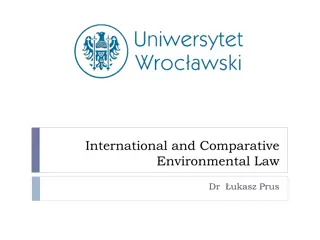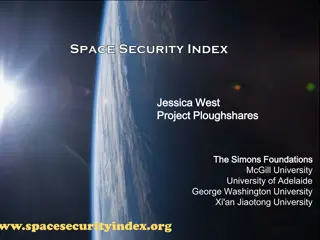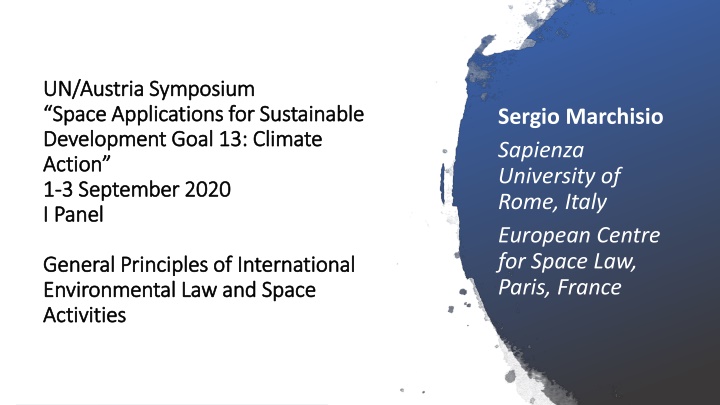
General Principles of International Environmental Law and Space Activities
This content delves into the fundamental principles of international environmental law as they relate to space activities. It covers topics such as the no harm rule, sustainable development, and the relevance of general principles in space law. The discussion highlights the importance of aligning economic development with environmental protection in both terrestrial and outer space domains, emphasizing the need for responsible policies and technology utilization to ensure sustainability.
Download Presentation

Please find below an Image/Link to download the presentation.
The content on the website is provided AS IS for your information and personal use only. It may not be sold, licensed, or shared on other websites without obtaining consent from the author. If you encounter any issues during the download, it is possible that the publisher has removed the file from their server.
You are allowed to download the files provided on this website for personal or commercial use, subject to the condition that they are used lawfully. All files are the property of their respective owners.
The content on the website is provided AS IS for your information and personal use only. It may not be sold, licensed, or shared on other websites without obtaining consent from the author.
E N D
Presentation Transcript
UN/Austria Symposium UN/Austria Symposium Space Applications for Sustainable Space Applications for Sustainable Development Goal 13: Climate Development Goal 13: Climate Action Action 1 1- -3 September 2020 3 September 2020 I Panel I Panel Sergio Marchisio Sapienza University of Rome, Italy European Centre for Space Law, Paris, France General Principles of International General Principles of International Environmental Law and Space Environmental Law and Space Activities Activities
General Principles of Law as an Autonomous General Principles of Law as an Autonomous Source of International Law Source of International Law Different functions played by general principles of law Environmental declarations of principles as matrix of customary norms and treaty law General principles of international environmental law enjoying significant support General principles transposable to the space environment Principles of space law relevant to environmental protection
General Principles of International Environmental Law General Principles of International Environmental Law Functional to Space Activities Functional to Space Activities 1. The no harm rule as the basic prescription The duty of states to avoid activities in their territory causing significant damage to the environment of other states Stockholm (1972) and Rio (1992) Declarations of principles: permanent sovereignty over natural resources and the prohibition of activities that cause transboundary harm to other states or to areas beyond the limits of national jurisdiction A due diligence obligation, requiring policies, legislation and best available technology Applicability to private activities in outer space
General Principles of International Environmental Law General Principles of International Environmental Law Functional to Space Activities Functional to Space Activities 2. The principle of sustainable development/sustainability of space activities The twofold perspective: space applications for the terrestrial sustainable development and the sustainability of outer space activities From concept to objective: the need to reconcile economic development and protection of the environment. Main elements of the principle Difficulties in the transposition to space activities: the 2019 Guidelines on the long- term sustainability of space activities 3. Other general principles of international environmental law relevant to space activities
General Principles of International Environmental Law General Principles of International Environmental Law Dysfunctional to Space Activities Dysfunctional to Space Activities 1. The common but differentiated responsibility principle: Positive aspects: special needs of developing countries, capacity building, technology transfer and international cooperation Different legal obligations as the major obstacle in negotiating a universal new climate binding agreement, despite the weakening of the principle in the Paris Agreement 2. The precautionary principle: Precautionary standard already largely adopted with regard space activities. Approach implicit in the planning of space projects Lack of full scientific certainty and cost-effective measures to prevent environmental degradation as concepts hardly transposable to space activities
Conclusions Conclusions Consolidation of general principles of environmental law into concrete norms from the progressive sedimentation of coherent state practice, sometimes assisted by judiciary case-law, or by their inclusion in international conventions A process more complex with regard to space activities, where the international law-making is difficult and slow and currently realized trough the adoption of non- binding guidelines The role of general principles of international environmental law in the regulation of space activities mainly as gap-fillers

